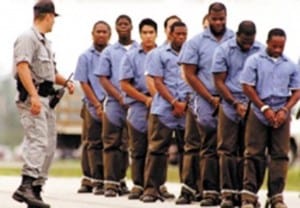Mass Incarceration & People of Color
One in every 31 Americans is on probation, on parole, in jail or in prison. Distressingly, according to the Bureau of Justice Statistics, one in three African-American men can expect to be incarcerated at some point. These statistics reflect systemic problems in the U.S. justice system and the punitive nature of our society. Every day, boys, girls, men and women are funneled into the criminal justice system due to systemic racial bias, the school-to-prison pipeline, lack of access to mental health treatment, co-occurring disorders, domestic violence and poverty, among others. And for communities of color, this is occurring at an exceptionally high rate. This over-incarceration of people of color is sometimes referred to as the New Jim Crow, harkening back to one of the most racist periods in U.S. history.
Data Snapshot:
- While people of color make up about 30 percent of the United States’ population, they account for 60 percent of those imprisoned[1].
- As the number of women incarcerated has increased by 800 percent over the last three decades, women of color have been disproportionately represented. African American women are three times more likely than white women to be incarcerated, while Hispanic women are 69 percent more likely than white women to be incarcerated[2].
- The “war on drugs” has been waged primarily in communities of color. According to Human Rights Watch, people of color are no more likely to use or sell illegal drugs than whites, but they have higher rate of arrests. African Americans comprise 14 percent of regular drug users but are 37 percent of those arrested for drug offenses. From 1980 to 2007 about one in three of the 25.4 million adults arrested for drugs was African American[3].
- Once convicted, black offenders receive longer sentences compared to white offenders. The U.S. Sentencing Commission stated that in the federal system black offenders receive sentences that are 10 percent longer than white offenders for the same crimes. The Sentencing Project reports that African Americans are 21 percent more likely to receive mandatory-minimum sentences than white defendants and are 20 percent more like to be sentenced to prison[4].
- Before the recent sentencing reform for crack-cocaine, the racial disparity in crack-cocaine sentencing was 100:1; disproportionately affecting people of color charged with crack-related offenses[5].
- 80% of defendants sentenced to death in federal courts are people of color.[6]
This is known as Disproportionate Minority Contact (DMC). While you look at the data, remember that this represents people: parents, siblings, children, neighbors, students, professionals, and community members. Due to the collateral consequences that justice-involved people experience, which impacts minorities more severely, we as a society, are essentially systematically disenfranchising racial minorities in the United States by taking away their right to vote, by denying them access to public benefits, by dramatically increasing their barriers to obtaining employment, and by separating parents, from their children at exceptionally high rates with all intended consequences of such actions.
- Among Black children, 1 in 9 have a parent in jail (2012 data)[7]
- Among Hispanic children, 1 in 28 have a parent in jail (2012 data)
- Among White children, 1 in 57 have a parent in jail (2012 data)
These are the effects of mass incarceration. It is because of these people that we need to not only dismantle the current system of criminal justice, penalization and mass incarceration, but also seek best practices to improve the status quo. If one in three African-American men born after 2000 can expect to go to prison at some point in their lifetime, the system is broken, but besides acknowledging the system’s deficiencies, we need to initiate viable alternatives.
This affects everyone. Minorities currently represent one-third of the US population. Almost everyone knows someone who has been impacted by the American criminal justice system and can share an anecdote of how mass incarceration has compromised futures, devastated lives and annihilated entire ethnic communities. Please feel free to share yours with us!
I have over 2.3 million reasons to dedicate my time and energy into this human rights issue. And by the time I have children, I hope that my African-American son will no longer face a 1 in 3 likelihood of going to prison.
Post by SCSJ Macro Social Work Intern Oprah Keyes

